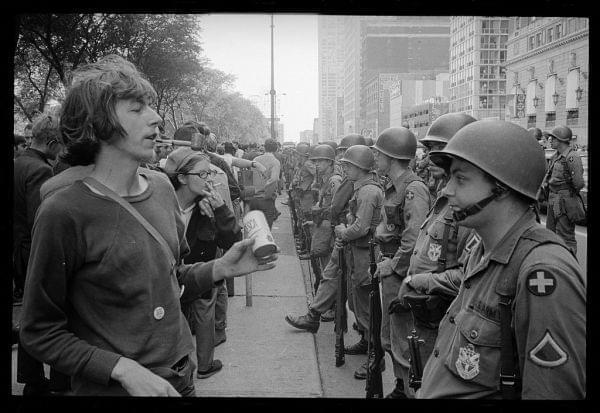ENCORE: The 1968 Democratic National Convention; The Partition of British India; The Life of Albert R. Lee

Young "hippie" standing in front of a row of National Guard soldiers, across the street from the Hilton Hotel at Grant Park, at the Democratic National Convention in Chicago, August 26, 1968.
All this week, we’re sharing some of our favorite history conversations from the show, including our interview with Marsha Barrett and Chicago Tribune columnist Rick Kogan on last year's 50th anniversary of the 1968 Democratic National Convention in Chicago. Plus, more than 70 years ago this month, British India was divided into separate states - now known as India, Pakistan, and Bangladesh. This came to be known as Partition. We spoke with Rohini Ramkrishnan, Digital Archive Manager with the 1947 Partition Archive. And then, the story of a remarkable African-American man who, starting in 1895, helped black students at the U of I succeed and thrive at a time when they weren’t even allowed to live in the dorms.
Discontent over the course of American politics, both at home and in the Vietnam War - drew 10,000 protesters to the city who clashed with Chicago police. Marsha Barrett teaches history at the University of Illinois in Urbana, and specializes in U.S. political history. She tells us more about some of the events of that decade that created the environment for protests at the convention. Kogan, a teenager in Chicago that summer, also shares his memories of those chaotic four days that summer of 1968.
Plus -
Seventy-two years ago this month, British India was divided into two separate states - India and Pakistan. This came to be known as Partition. Massive numbers of people scrambled to get to the new majority Hindu and Muslim countries - and in the process, the resulting violence killed an estimated 2 million people and displaced many more. Today, modern-day South Asians want to make sure those personal stories aren’t lost to history. The 1947 Partition Archive project has collected more than 4,000 interviews from people all around the world - including two from right here in Illinois. Rohini Ramkrishnan is the digital archive manager of the 1947 Partition Archive. The 21st spoke with her about this in the summer of 2017.
Then -
The first African-American student at the University of Illinois enrolled in 1887. That’s long before many other public universities in the U.S. - especially in southern states.
But that doesn’t mean life was easy, both back then, and in the decades after. Black students weren’t allowed to live in dorms and were often denied basic services in the towns of Champaign and Urbana. For many of those students, an African-American man named Albert Lee was a lifeline. He started working at the University of Illinois in 1895. And for the next 50 years, he worked at the university, including as chief clerk of the U of I’s president's office. During that time he became known as the unofficial dean of African-American students, for the work he did to advocate for black students and connect them with resources they didn’t have access to.
Last summer, members of his family gathered at U of I to commemorate his life. We revisit a conversation with one of them, Albert’s great grandson David Lee. He works as a public health professional in Los Angeles.
We also spoke with Vanessa Rouillon. She's working on a biography and a documentary about Mr. Lee’s life. She’s an assistant professor of writing and rhetoric at James Madison University in Virginia.

